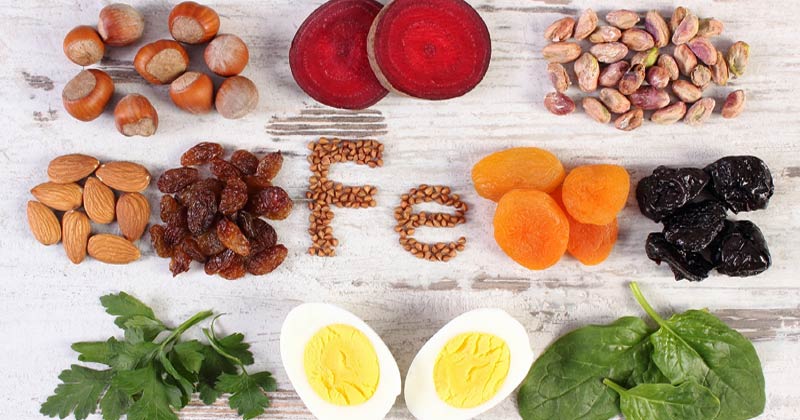Why The Body Needs Iron?
The body needs iron to ensure the supply of oxygen from the lungs to the cells. It also promotes metabolism in the body. Iron helps with hemoglobin formation and without hemoglobin, erythrocytes, that is the red blood cells, are unable to effectively transport the oxygen to the cells.
How Much Iron Does The Body Need?

The iron requirement is calculated by various factors. One of them is age. Children and the elderly generally need more iron. This also applies to competitive athletes because they lose an above-average amount of minerals through sweating . Women of childbearing age generally have a higher iron requirement than men due to menstrual bleeding. On average, the body needs ten to 15 milligrams of iron a day. Pregnant women need 20 to 30 milligrams.
Causes of Iron Deficiency

One of the main causes of iron deficiency is an unbalanced diet . People who do not eat meat are more likely to have problems. There is sufficient iron in vegetarian foods, but in a form that the body can process poorly than iron from meat.
Increased blood loss due to ulcers, chronic inflammation in the gastrointestinal tract or bleeding hemorrhoids , can also be the cause for iron deficiency.
Certain physical changes can also go hand in hand with an increased iron requirement and thus promote an undersupply. Children and teenagers in particular need more of the trace element iron, in the growth phase, but also women during pregnancy and while breastfeeding.
Symptoms And Consequences of Iron Deficiency

Since the body cannot supply itself with sufficient oxygen when there is a lack of iron, this leads to:
- Fatigue
- Overtiredness
- Pale and dry skin
- A headache
- Dizziness
- Shortness of breath (or heavy breathing after climbing stairs)
- Thinning nails
- Muscle twitches and cramps
- Iron deficiency anemia (iron deficiency anemia).
The Right Diet For Iron Deficiency

Iron deficiency arises because your body cannot produce iron itself and on average even loses 1.5 milligrams per day. The iron can only be supplied through food intake. However, the body can only process about one-tenth of the iron that is contained in food. Unless you are consuming vitamin C, which supports the absorption of iron.
What Foods Contain Iron?

Whole grains and vegetables are especially helpful here . Plant-based foods, however, have the disadvantage that the body is more difficult to process the iron content. It is easier for the body with animal products such as meat or fish .
Vegetarians should therefore take care to compensate for the loss. Iron-rich vegetables such as spinach, lettuce, legumes and whole grain cereals must be consumed to maintain irin levels in the body. Flax seeds, lentils, wheat germ and soybeans are also suitable. The so-called pseudo-cereals like millet , quinoa or amaranth contain a lot of iron.
However, you should avoid coffee, tea and milk with meals rich in iron, as these foods inhibit the absorption of iron.
Be Careful with Supplements

Taking capsules or supplements for iron deficiency from the pharmacy itself can always be risky. Although these remedies can help to replenish the iron balance, they can also trigger a so-called secondary hemochromatosis which is an iron overload in the body.
You don’t feel the effects at first, but the long-term consequences can be considerably bad. The excess iron can accumulate in organs such as the heart and liver and thus permanently impair their function. Therefore, it is best to consult your family doctor and coordinate the dosage that suits you best.


